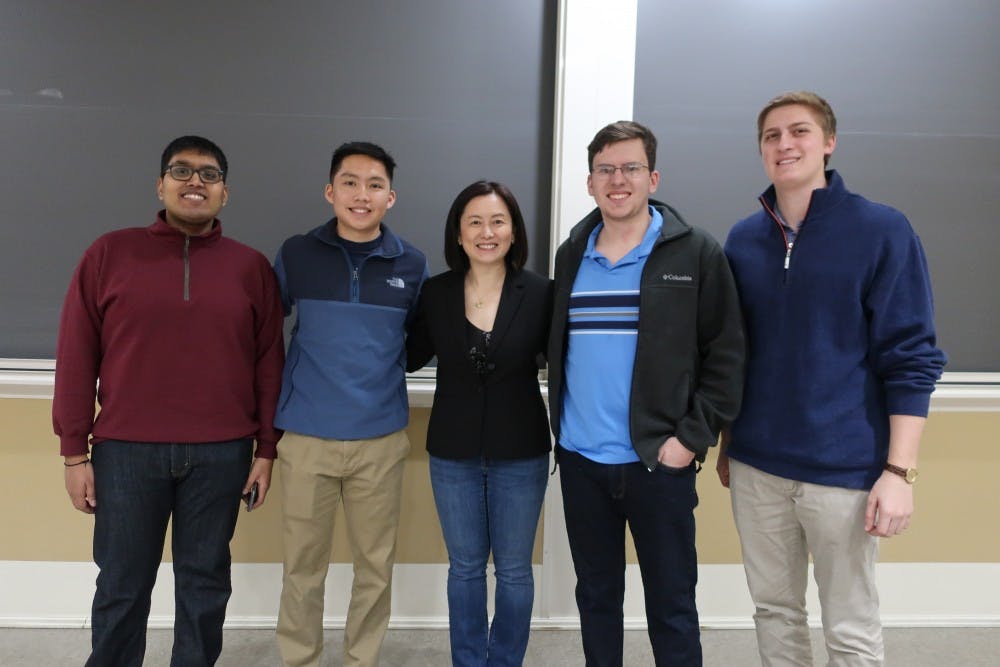Not many people can say they hold the record for the youngest female managing director at Goldman-Sachs, graduated cum laude from Harvard College in three years or single-handedly spearheaded Goldman’s investments in technology start-ups through the principal investment area for Asia. That is, except for Syaru Shirley Lin, who has been a professor in the University politics department since the fall of 2012 and an adjunct associate professor at the Chinese University of Hong Kong. At the University, Lin teaches classes on international economies, specifically in Asia.
Right after college, Lin joined Morgan Stanley, working at least 100 hours a week before moving on to work at Goldman Sachs.
“It was a perfect fit,” Lin said. “I loved my job. There were awful people, there were great people. There were awful clients, and there were great clients, but whatever it was, I loved it. I wanted to go to work, solve the problem ... At 31, they told me I would be the youngest managing director. They started to put me on all the ads — Forbes, Fortune 500.”
Lin moved on to lead various ventures at Goldman Sachs, serving as a founding board member on numerous groups and foundations. She currently serves on several boards — including the Goldman Sachs Asia Bank — and as a member of the Hong Kong Committee for Pacific Economic Cooperation, appointed by the Hong Kong government.
In the academic setting, Lin’s faculty peers and past students spoke about her powerful personality. Sociology Prof. Krishan Kumar — the William R. Kenan, Jr. Professor of Sociology at the University — commends her ability to masterfully incorporate her past experience in private investment with her teachings in the academic setting.
“She keeps a foothold in her previous life, and I think this feeds very helpfully into her academic work,” Kumar said. “She has a kind of knowledge from participation in a non-academic world that most of us don’t have. We read about those things, but she actually lives in them.”
Kelly Abbinanti, Class of 2016 alumna who now works in defense consulting at the Pentagon in tandem to studying at Georgetown University’s security studies program, describes the insights that Lin’s teaching style has impressed upon her and how this applies to how she approaches issues today.
“If you really want to understand an issue — this could be a personal issue, a global issue, a national security issue — you have to look at it and analyze it from all perspectives,” Abbinanti said. “That was … something I saw Prof. Lin do so, like her experience in China, in Hong Kong, in Taiwan, in the U.S. [Altogether] it was something that she used to put this story together that literally pioneered the way that people look at cross-strait relations.”
James Johnson, Class of 2017 alum currently studying public policy at the University of Chicago’s graduate program, noted how, despite Lin’s groundbreaking achievements, she still remains modest and appreciative of her students, expressing curiosity and support for their current endeavors.
“Prof. Lin is one of the kindest, most gracious human beings I’ve met during my time at U.Va.,” Johnson said. “She’s been a great support system in the time frame since and has kept in touch with me and made sure I was on a path that was going to be a good one for me.”
Amidst this ascension in the worlds of private equity, venture capital and academia at the University, a lingering question begged to be answered — was true happiness sustainable throughout all of these endeavors and accomplishments?
Everything comes at a price — an adage ironically applied to Lin’s experiences and ventures. Despite the burdensome prospects of a working life apart from her family on one hand and conducting solo research through the University of Hong Kong for her doctorate on the other, she still views this trade-off optimistically.
“What sustained me was looking at bad companies and good companies — that together is what makes me so knowledgeable,” Lin said. “I love that every company I looked at, I knew 50 other of their competitors, so that made me realize that I was an expert — and that really makes it satisfying.”
This knowledge and experience is what catalyzed Lin to the success she has achieved today. She refers to this as the result of constant trade-offs. On the flip side of attaining her expertise, Lin had to work long hours, traveling for excessively long periods of time in order to investigate state-owned enterprises in mainland China, Taiwan and Singapore to potentially privatize.
Her time spent researching at home in Hong Kong reveals an accompanying trade-off. She recalls the loneliness that she felt in lieu with her doctoral research, unable to be surrounded by the companies and colleagues with whom she would have otherwise collaborated if she had stayed in the business world.
“The only contact I had with the world was when I was a teacher’s assistant because I was a Ph.D. student, even though I was so much older,” Lin said. “I loved those students because I didn’t really know young or local people. So suddenly, I started to get to know the city where I was living, and I had so much fun.”
Lin said her ability to capitalize on her skills, passions and values in the long run has allowed her to achieve new heights unprecedented by others in the investment and privatization fields.
“I think I do a lot of things that eventually make me an expert — whether it’s in investing or as an expert on China-Taiwan relations — it takes years,” Lin said. “And so in the process, you’re not happy every day, but looking back, I’ve had a very happy set of careers.”







